RSNA Press Release
- With Doppler ultrasound, normal embryonic heart function can be determined at six weeks of gestation.
- Researchers have identified embryonic congestive heart failure for the first time.
- Virtually all pregnancies in which the embryo has abnormal heart function miscarry.
- Congestive heart failure in an embryo is similar to that in the elderly
Doppler Ultrasound Predicts Risk of Miscarriage
Released: December 2, 2003
|
Media Contacts: |
Heather Babiar or Maureen Morley | (630) 590-7762 |
|
Heather Babiar (630) 590-7738 hbabiar@rsna.org |
Maureen Morley (630) 590-7754 mmorley@rsna.org |
CHICAGO — Doppler ultrasound performed in early pregnancy can accurately identify embryonic congestive heart failure and subsequent risk of miscarriage, according to research being presented today at the 89th Scientific Assembly and Annual Meeting of the Radiological Society of North America (RSNA).
"The chances the pregnancy will continue are very high, about 95 percent, when Doppler ultrasound confirms normal embryonic heart function at six weeks," said the study's author Jason C. Birnholz, M.D., president of Diagnostic Ultrasound Consultants in Oak Brook, Ill. "Over 99 percent of pregnancies with an abnormal Doppler pattern do not continue." The Doppler test measures the speed of red blood cells moving through vessels to determine pressure dynamics within the embryo's heart.
Miscarriage is the most common complication of human gestation, occurring in approximately 20 percent of recognized pregnancies, according to the National Center for Health Statistics.
Dr. Birnholz performed endovaginal ultrasound imaging on 1,530 pregnant women to evaluate embryonic heart function early in the first trimester. With endovaginal ultrasound, a probe is inserted into the vagina.
Using high-resolution ultrasound imaging and highly sensitive Doppler, Dr. Birnholz was able, for the first time, to identify congestive heart failure in embryos. The condition is characterized by increased free amniotic fluid and evidence of depressed myocardial contractility (ability of the cardiac muscle to shorten itself). With the new Doppler technology, embryonic congestive heart failure is easily identified and, according to the study results, can be implicated in 40 percent of miscarriages.
"The cause of embryonic congestive heart failure — not enough oxygen reaching the heart — is much the same in embryos as it is in the elderly," Dr. Birnholz said. "I suspect that if the blood vessels that feed the placenta do not properly form or are slightly delayed in development, the heart does not get the support required."
The Doppler technology provides higher sensitivity and higher specificity than conventional ultrasound and may eventually allow for early intervention, according to Dr. Birnholz. He speculated that prospective treatment might be as simple as providing supplemental oxygen to an expectant mother during the critical time of development.
"Doppler evaluation provides prospective parents with early information about what they are facing," said Dr. Birnholz.
Dr. Birnholz hopes that further research into embryonic congestive heart failure will enable new therapeutic possibilities to prevent miscarriage.
RSNA is an association of more than 35,000 radiologists, radiation oncologists
and related scientists committed to promoting excellence in radiology through
education and by fostering research, with the ultimate goal of improving patient
care. The Society is based in Oak Brook, Ill.
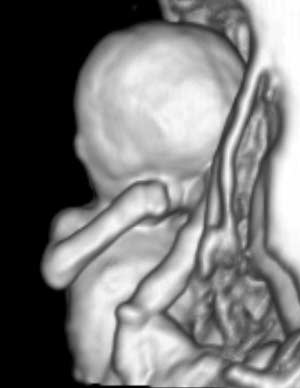 |
|
|
Embryo close-up |
|
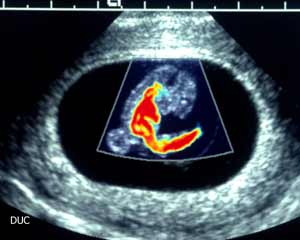 |
|
|
Energy doppler 2 |
|
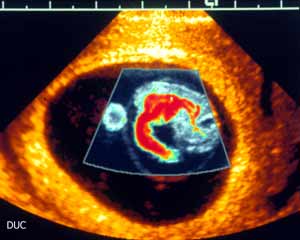 |
|
|
Energy doppler
|
|
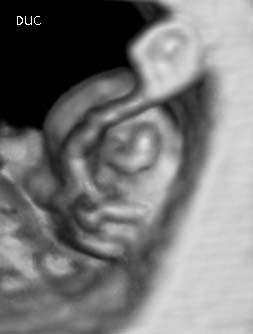 |
|
|
Patient 3D |
|
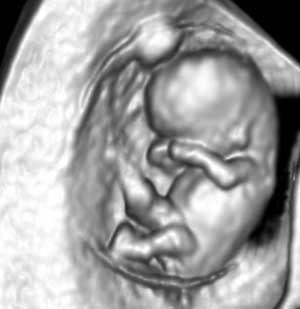 |
|
|
Case P1 3D |
View related abstract:
# # #
 PDF
PDF